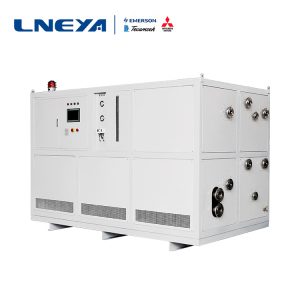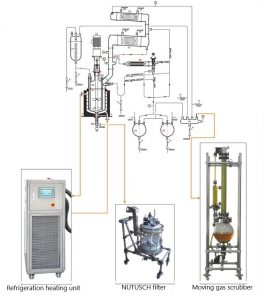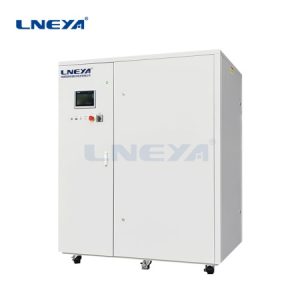New energy vehicle battery motor test motor oil chiller and liquid chiller
In the new energy industry, cooling methods mainly include natural cooling, air cooling, liquid cooling, and oil cooling. The cooling of new energy motors mainly includes oil cooling and liquid cooling. Then, these two cooling methods How are they all? Next, LNEYA a new energy motor oil cooler manufacturer, will give you a detailed introduction:

New energy motor oil cooling and liquid cooling applications:
- The new energy motor oil cooler is mainly used in hybrid vehicles, because hybrid vehicles need to consider the cooling of the internal combustion engine and the motor at the same time, so it is more appropriate to use oil cooling. The cooling method of the new energy motor oil cooler is to pump the oil into the oil pipe through the oil pump. The oil pipe installed inside is perforated, and the oil is sprayed inside the motor to achieve the dual functions of cooling and lubrication.
- New energy liquid coolers are mainly used in pure electric vehicles, because liquid cooling can more effectively remove the heat from the motor and prevent the motor from overheating. The liquid cooling method is basically the same as the liquid cooling method of the engine. The coolant is provided with water channels inside the casing, and the stator is installed in the casing. The coolant does not directly contact the stator, and dissipates heat in the form of heat conduction.
How to choose between oil cooling and liquid cooling for new energy motors:
- As for which is better, oil cooling or liquid cooling, it actually depends on the specific usage scenarios and needs. The cooling effect of the new energy motor oil cooler is slightly worse than that of liquid cooling, but in some special cases, such as high altitude or cold environment, the cooling effect of the new energy motor oil cooler will be more stable. The cooling effect of the new energy liquid cooler is better, but in the environment of large temperature difference, the liquid cooling may produce some condensed water, so it is necessary to pay attention to prevent the motor from getting wet.
- As for whether the pure electric vehicle motor is cooled with oil, this is possible, but relatively rare. Because the motor of a pure electric vehicle is mainly driven by electricity, it is more necessary to consider the efficiency and service life of the motor, and the choice of the cooling method of the new energy motor oil cooler is more determined according to the specific model and usage scenario.
Oferecer 7 * 24 consultas gratuitas e soluções abrangentes


Correio eletrónico: sales@cnzlj.com
WhatsApp: 086 13912479193
Recomendações relacionadas
-
Instruções de carregamento do refrigerante do congelador com grandes diferenças de temperatura
2036No desenvolvimento da indústria moderna, o congelador de grande diferença de temperatura também é importante no tratamento a frio. Em todo o processo de refrigeração do congelador de grande diferença de temperatura, o carregamento de refrigerante também é mais importante. Então, como é que...
Ver detalhes -
Como resolver o problema da falha da bomba de circulação da bomba de refrigeração?
1711Os dispositivos de aquecimento por refrigeração são necessários em muitas aplicações químicas, farmacêuticas e laboratoriais. Então, como resolver a falha do dispositivo de aquecimento de refrigeração também está preocupado com a forma de resolvê-lo? 1. Falha da bomba de circulação A bomba de circulação...
Ver detalhes -
Porque é que os refrigeradores de etilenoglicol podem ser utilizados para reacções de polimerização e acoplamento
13601. Aquecimento da polimerizaçãoGeralmente, as matérias-primas da reação de polimerização são alguns solventes inflamáveis, e o aquecimento rápido pode fazer com que a temperatura local seja muito alta e causar acidentes. Cada reação de polimerização tem a sua própria reação...
Ver detalhes -
Refrigerador para caldeira de destilação de 200L
1249O resfriador para a chaleira de destilação de 200L precisa atender a duas funções principais ao mesmo tempo: uma é condensar o vapor de metanol e a outra é resfriar o material durante o processo de reação. ...
Ver detalhes
 LNEYA Refrigeradores industriais Fabricante Fornecedor
LNEYA Refrigeradores industriais Fabricante Fornecedor















Submeter para consulta
Responder-lhe-emos no prazo de 24 horas